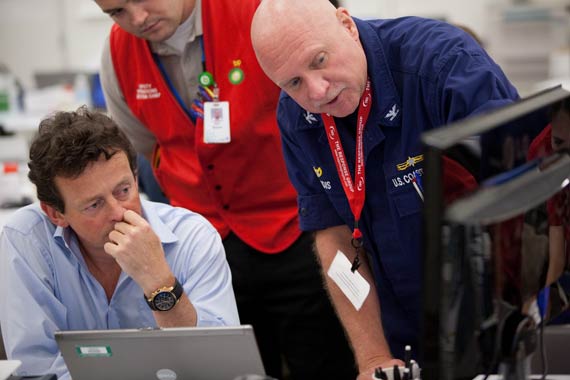
BP’s embattled CEO, Tony Hawyard is no doubt working hard to boost the company’s reputation following the oil crisis which started on 20th April 2010. Week after week he has faced the media, stood up against negative interviewing and even had to cope with the criticisms of the US President, Barack Obama. Relentless headlines have filled the cuttings book at the BP press office, no doubt. Millions of words have been published around the world criticising the company. And that’s all before we take into account the massive online onslaught that BP has faced.
As well as facing the gushing oil constantly pouring out from the sea bed, Mr Hayward is having to face a downpour of disaster headlines. So, what can be done?
People can argue all they like about “it shouldn’t have happened” or that the “American authorities are partly to blame” or that “Obama should be more confrontational”. None of that is going to deal with the reputation issue which BP is facing.
So, today the company has announced it will be spending $1m a month on additional online activities, such as Google AdWords, in a bid to improve the communication of its side of the story. Say what you like about BP, they have already been doing many of the “right things” online. For instance, they have an active Twitter account detailing what they are doing, the front page of their own corporate website is dominated by their response to the Gulf of Mexico crisis, they have a Facebook Page which provides regular information and they have several dedicated websites on the whole issue. Not only are the BP employees working hard at the incident site, but their web operations are working round the clock too.
The AdWords campaign might help, but BP already tops the list for the handful of ads that appear for things like “oil spill”. True, it is not doing so well on YouTube, where comedy videos are the most popular, so the adverts there could help.
So what more could BP do online? Their budget is amongst the biggest, their social media activities are relatively significant and their web strategy is very good, it seems. So what is wrong?
Well, for a start they could be adding content to article websites, they could be getting interviews placed on others sites, such as those run by the fishing communities or on political sites and they could be running webinars, teleseminars and so on. In other words, their content strategy is pretty limited at the moment. True, what they are doing is far better than many companies have attempted in crisis situations, but they need to do more content production and placement.
But here’s the problem. The vast majority of the online vitriol against BP is triggered by mass media coverage on TV, radio and in the printed press. Trending topics on Twitter, for instance, tend to go hand in hand with major TV events – the World Cup being a good example. When BP is getting TV coverage, the Tweets go up. The online world is tightly integrated with the offline one. That means that the BP strategy of buying up Google AdWords is only likely to work if they invest pretty heavily in offline methods of driving traffic to the web.
Ultimately, though, the “trick” is not giving up. No matter how hard it seems to face the barrage of criticism, what BP are doing is largely the right thing online – they just need to do more of it, lots, lots more. One of the reasons that online reputations get damaged, sometimes irreparably, is because the “victims” of that damage give in and give up. It is rather like blogging or running Google AdWords campaigns themselves; results rarely happen overnight, but after a sustained approach.
The work that BP is now doing online – perhaps rather late in the day admittedly – will need to continue, for a long time after the spill is cleaned up and forgotten. The shareholders need preparing for the notion that the $1m a month could well be necessary for many dozens of months to come. And more money besides.
If you can learn anything from the BP case history, it’s that your online reputation needs protecting in many different ways. Simply having a Tweet here and there, or a Facebook page and an announcement on your website is not enough. It is a 24/7 job involving many, many different ways of getting your message across using multiple websites and many different online services. And you need to integrate it well with your offline efforts. Otherwise you will not make much of a dent in your battered reputation.
If BP continues with its current strategy, the money they are spending on online activities could well eventually rescue their battered reputation – unless, of course, they give up too soon or the shareholders criticise the spending on this “new fangled stuff”.
